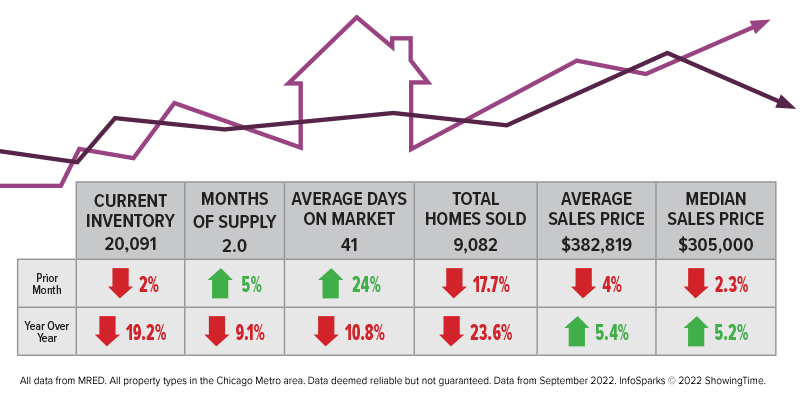Mortgage interest rates have risen dramatically to over 7%. If you bought a $400,000 home with 20% down in January, when rates were averaging 3.2%, your mortgage payment would have been $1,384. The same home would now at 7.04% would have a mortgage payment of $2,137. Obviously, rising rates will slow the housing market as buyers struggle to qualify for mortgage loans. Some help may be on the way as Fannie Mae’s August forecast predicted rates to fall in Q2 of 2023 to 4.5%.
Home prices are starting to drop on a month-over-month basis, but are up +5.4% on average annually in the Chicagoland market. The rate of price increases is slowing. In May average prices were up +7.8% annually. While some sellers are dropping prices, in September 99% of closed listings in the Chicago area sold at their original listing price. In pre-pandemic September 2019, 95.6% of listings got their asking price. Homes are still selling quickly with the average days on market at 41, compared to 58 in May.
Because homes are selling fast at higher prices, this indicates that low inventory is the primary drag on home sales. Inventory is down -19.2% annually and closings are down -23.6%. Inventory is improving, with 20,091 homes on the market in September vs 12,545 in May. But to put current numbers in perspective, in September 2019 there were 37,529 homes on the market.
With geopolitical and economic headwinds gaining strength the US economy is performing amazingly well. The Atlanta Federal Reserve’s GDPNow model is forecasting a positive +2.9% gross domestic product (GDP) growth for the third quarter. Inflation has eased slightly since July falling to 8.2% from 8.5%. The job market continues to surge forward with unemployment at a 53-year low of 3.5%.
The Chicago metro area is following national economic trends. According to the Bureau of Labor Statistics, the Chicago area gained over 200,000 jobs in the last year, wages have increased by 5.8%, and unemployment is at a 50-year low of 4.9%. Chicago area inflation is 8.7% according to the BLS. The US Commerce Department reported that Illinois crossed a major economic milestone in Q2 of this year when state GDP reached $1.024 trillion. Illinois is one of only 5 states (including California, Texas, New York, and Florida) to accomplish this feat.
As the market shifts, it is important to have an experienced real estate professional at your side. If you are thinking of buying or selling a home call us today for a free analysis of your real estate needs.

